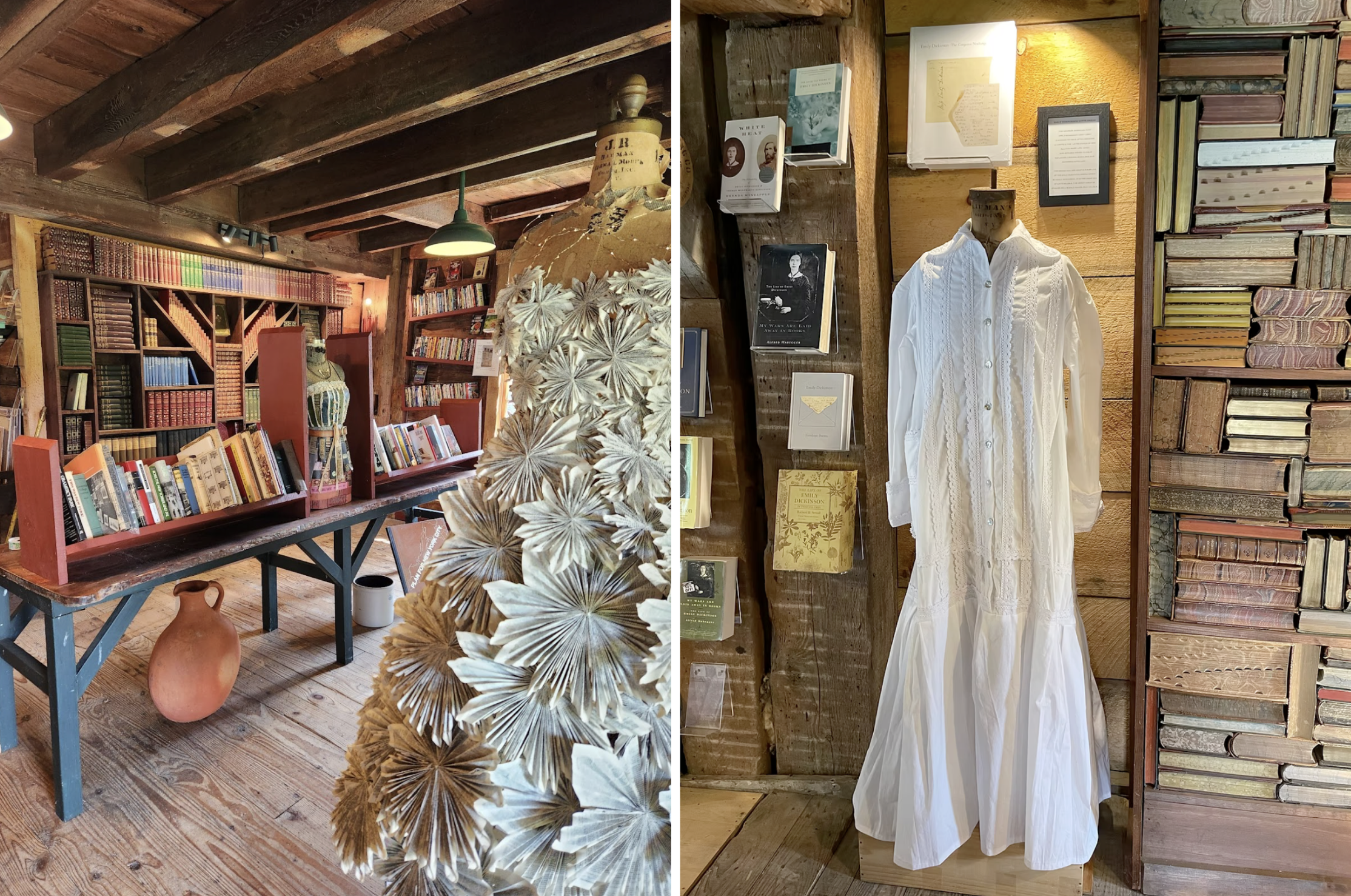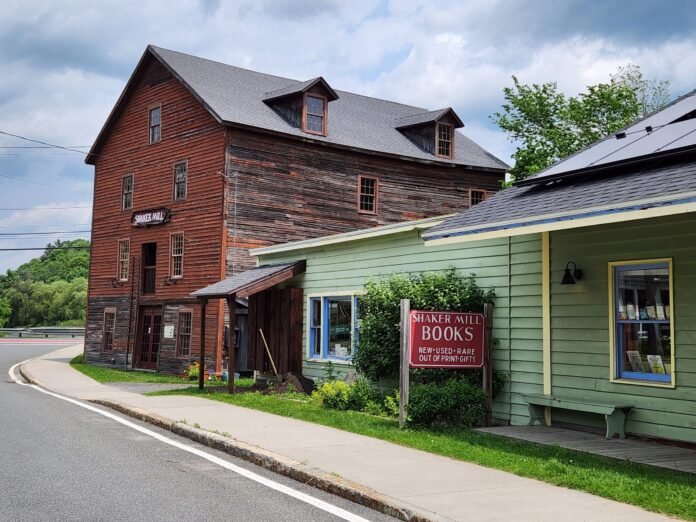“This whole place is like a cozy love story to books and reading. Nice people, great books, good prices, beautiful setting, stunning views… worth the trip! Check to make sure they are open before you plan to visit.”
— Donna Childs
“I come here for high-end, rare, signed photography books, history books, first editions, rare books, and much more… Always a pleasant and intriguing experience finding something new and interesting to take home and enjoy.”
— Nathaniel Goepen
Eric Wilska’s book-selling story begins in 1974 with the opening of The Bookloft in Great Barrington—which, decades later, is still operating under new ownership and in a different location. As he wrote for that store’s 41st anniversary:
“Once upon a time, in a land called the Berkshires, there lived a young man by the name of Eric Wilska. One day, Eric set out to make his fortune. He didn’t have to look long, however, before he found his true calling. So he busily set about the business of opening up his first bookstore. Soon enough, the day of the grand opening had arrived. People came from far and wide to see the new bookstore, including his mother and grandmother. Everyone lauded his entrepreneurial spirit and said he would certainly go far. His grandmother was even the first person to purchase a book that earned him his first dollar!”

Wilska was 24 years old when he launched that business (in Barrington Plaza), at a time when Matt Tannenbaum’s The Booksore in Lenox was the only game in town. “I always loved books. I started reading seriously my senior year in high school and brought a trunk load with me to college,” says Wilska, an English major with an entrepreneurial spirit. “My father was an inventor, builder, and contractor, and we had a lot of teachers in our extended family.”
He started The Bookloft for $4,500—”$3,000 of which I sourced through a loan from Pittsfield National Bank with no credit to my name,” he notes. He ran that store for 42 years, first adding a mostly online offshoot called Found at the Bookloft in West Stockbridge, and later a used bookstore called Running Fence Books in Pittsfield.

Then, in 2012, Wilska purchased the property at 3 Depot Street in West Stockbridge, including the building that now houses Shaker Mill Books and the adjacent Shaker Mill, a beloved local historic landmark and former gristmill. “The Baldwin family was selling the entire property. Although I didn’t think I needed the barn, I agreed to take it,” he says, noting that it was already zoned for commercial use. “Scott Sawyer had been using it to sell antiques before that—it took six weeks to empty the four-story structure!”
Ending one chapter, starting another
Wilska continued to own and operate both businesses for three years before selling The Bookloft in 2016 (to Pamela Pescosolido, who moved the store to 63 State Road prior to selling it to Giovanni Boivin). “It was a good run of 42 years—that’s long for a bookstore to remain profitable. I’m very proud of it,” he said upon closing, adding, “I plan to keep my hand in books, just not the new book world.”
Today, Shaker Mill Books is the culmination of decades of bookselling and boasts an eclectic collection of over 30,000 books—”used, rare, antiquarian, out-of-print and some new.” The titles are all individually priced, a task Wilska describes as a constant work in progress. While there are books for every interest (including a large children’s section), the shop’s selections of photography and art books, as well as local history titles, are particularly noteworthy.
He opened the barn seven years ago, and it remains a seasonal offering (June to October) because it lacks heat. Per his website, “Next door, the rustic and sprawling Shaker Mill has evolved from a convenient storage place for not-yet-shelved books into a wonder-filled display space that almost defies description. You’ll find dazzling oversize books that don’t easily fit on the shelves and tables at Shaker Mill Books… exquisitely bound or illustrated books of ordinary size that might be overlooked on a crowded bookshelf elsewhere… whimsical literary displays (e.g., Eric’s typewriter collection, which children are encouraged to experiment with)… book-related art… and art made from books.”

Ever-evolving (and intriguing) displays
“Each year, I get rid of something and add some new things to the barn. It’s a labor of love,” Wilska says. He considers books on photography to be his specialty, many of which were sourced from Taschen Publishing (including a $6,000 oversized signed edition of Annie Leibovitz’s most iconic photographs). When I visited, he and his long-time assistant, Jeff Wheeler, were unpacking boxes filled with books on film, Hollywood, art, and architecture that he recently acquired through a friend’s connection. The extra ones will be stored in the Housatonic warehouse.
“I try to do things a little differently,” Wilska continues, referring to his many “installations.” Local artist Deb Carter created both the Read Dress (out of 850 pages taken from Webster’s New World Dictionary, ironed, stretched, and placed into a stunning design) and the “steampunky corset” made out of leather bookbindings. “A niece of mine (Kate Wilska) just made this copy of the white dress Emily Dickinson wore, which became a muse for other poets and is on display at the Hadley Museum,” Wilska points out with pride.

A doghouse is made entirely of book covers and bindings set like stones, which Wilska made after taking a stone course in Vermont, and the sales counter consists of books layered like bricks, designed and built by Wilska’s son-in-law Anthony D’Aniello. Glass specimen cases from the Albany Natural History Museum house old books with unique bindings. An old artist’s case holds drawers of atlases. Another displays goofy titles like “Be married, and like it!” You’ll also find relics from the old grist mill used by the Tyringham Shakers.

Wilska is always happy to show new customers the tiny studio he carved out, where you can sit and watch the video “Books at Night,” created by the owners of a Toronto bookstore, imagining the books coming to life after the store closes (with delightful scenes of a book on Ginger Rogers dancing with one on Fred Astaire, and much more).
Wait, there’s more: An old furnace displays banned books, including Bradbury’s “Fahrenheit 451” and Charles Portis’s “True Grit”, beneath an Isaac Asimov quote: “A book worth banning is a book worth reading.” An antique Victrola’s handle still turns, and the record it was donated with is ready to play (the volume is adjusted by opening and closing the small front doors). You’ll find an old pool table and dentist chair on the second floor, and vintage models of structures that architect Christopher Owen built in nearby Berkshire towns on the third. (The fourth floor is used as a storage attic.)

Yet another wall display highlights the variety of traditional page treatments—stain, marble, gilt, deckle, and sprinkle. “And I’m building a color block window wall up here,” he says, pointing to a diamond-shaped wood insert filled with red-bound books, adding, “I’m not a designer, but over the years, you get to know what looks good. Angles matter.”
“Not as many kids come here as came to our old location, but we still get a lot of visitors from New York and Boston and a lot of repeat local customers,” Wilska notes. For those kids who do stop in, library card catalogues show the traditional (analog) way of searching and classifying books.
The lucky hippy bookseller, keeping on
Wilska no longer hosts author events, as he did regularly in his Great Barrington store. “This is enough work now,” he maintains. He does, however, still collaborate with local nonprofits on community events. For example, he is partnering with the New Marlborough Meeting House on two author discussions, one featuring Ruth Reichl and Kevin West on August 21, and the other exploring the future of solar energy with environmentalist Bill McKibben on September 13.
Who are Wilska’s favorite writers? “I love Wendell Barry, Ambrose Bierce, Ann Patchett,” he says, “but I love looking through books all day, no matter who the writer is.” His kids joke that they will one day need to stage an intervention when they move him to Vermont, but there’s at least a small chance his son, Kelt, might someday take over the operations.
“I was lucky to be able to start with nothing,” Wilska notes, recalling how his wife used to ask, “Did we do $100 in business today?” in his early days. “Now you would need $200,000 at a bare minimum,” he states matter-of-factly, citing software, inventory, and shelving requirements alone.

“When we have the roots music playing and the mid-afternoon sun gives the old wooden barn beams a reddish glow, it’s magic,” he smiles, adding “I love working, and the short drive from my grandparents’ old farm in Old Chatham [where he and his wife Evelyn still live] is good thinking time. I’ve made a good living as a hippy bookseller, and I’m lucky to have had the best staff. Lauren Losaw from The Bookloft days is still with me.”
“People comment every day that this is a really cool store, or that it’s one of their regular stops. We’re good at it, I think, which is lucky. Just because you like to read doesn’t mean you’d be a good bookseller. It takes a good eye for what people are looking for,” he acknowledges. “For me, nothing beats the thrill of the hunt,” he adds, describing his latest adventure to his favorite book warehouse in Pittsburgh with his friend Ken.
“This is a beautiful way to make a living, not a fortune,” Evelyn Wilska says. “Meeting people, sharing books and love of books, and experiencing the great sense of community here in the Berkshires has been wonderful. We feel so lucky to live here.”







